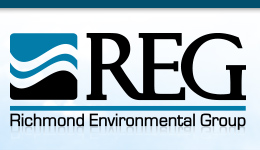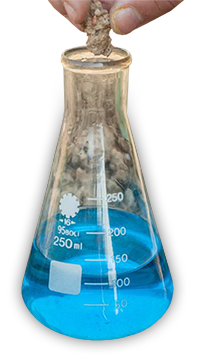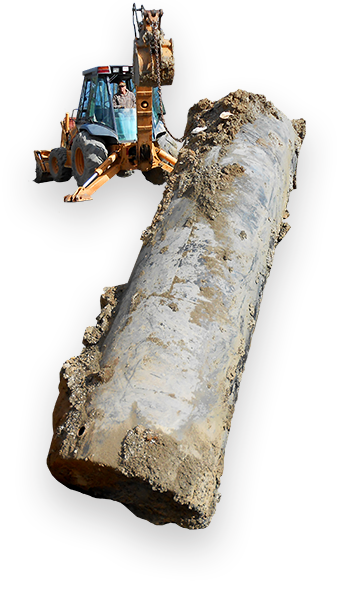
Underground Storage Tanks
Why Have Your Underground Storage Tank (UST) Tested?
.png)
Petroleum products have been stored in USTs for numerous years. Historically, these USTs have been constructed of steel (especially residential heating oil USTs). Over time these steel tanks begin to corrode, which will eventually lead to holes and/or breaches in the welded seams of the tank. When and how fast this corrosion takes place is dependent on a wide variety of variables.
It is important to have your UST tested for leakage, even if the UST in no longer in use, in order to:
- Prevent contamination of the environment
- Prevent potential impact to human health (i.e. contaminated drinking water, vapor intrusion, impact to basements/crawlspaces)
- Help maintain the value of your property
- Avoid delays/unforeseen costs at the time of property transaction
- Most mortgage/lending institutions will require that a UST is tested prior to issuing a loan on a real estate transaction.
- The State Wide Building Code states that home heating oil USTs that have been out-of-use for more than one year are required to be either removed from the ground or closed-in-place with an inert solid.
Initial Tank Testing/Investigation
 The first step in determining if your UST is leaking is to collect a soil sample from the base of the UST. REG performs this through the advancement of a hand auger boring or direct push technology (depending on the tank size). The soil sample is then analyzed by a state approved laboratory for the presence of petroleum compounds. If petroleum compounds are detected, evidence of a release of petroleum is required to be submitted to the Virginia Department of Environmental Quality (DEQ). The DEQ will then determine if corrective action is necessary in order to remediate the release.
The first step in determining if your UST is leaking is to collect a soil sample from the base of the UST. REG performs this through the advancement of a hand auger boring or direct push technology (depending on the tank size). The soil sample is then analyzed by a state approved laboratory for the presence of petroleum compounds. If petroleum compounds are detected, evidence of a release of petroleum is required to be submitted to the Virginia Department of Environmental Quality (DEQ). The DEQ will then determine if corrective action is necessary in order to remediate the release.Environmental Compliance
 The DEQ will determine the corrective action required to protect human health and the environment from the release of petroleum. The degree of corrective action is based on many factors including the quantity and severity of the release, as well as potential sensitive receptors at the site. Corrective action may include removal of all remaining liquids in the UST, excavation of petroleum-impacted soil, free-phase petroleum recovery, vapor extraction, and in-situ remediation of petroleum contaminated media. Financial assistance for all DEQ required corrective action may be available through the Virginia Petroleum Storage Tank Fund (see below for more details on financial assistance).
The DEQ will determine the corrective action required to protect human health and the environment from the release of petroleum. The degree of corrective action is based on many factors including the quantity and severity of the release, as well as potential sensitive receptors at the site. Corrective action may include removal of all remaining liquids in the UST, excavation of petroleum-impacted soil, free-phase petroleum recovery, vapor extraction, and in-situ remediation of petroleum contaminated media. Financial assistance for all DEQ required corrective action may be available through the Virginia Petroleum Storage Tank Fund (see below for more details on financial assistance).Virginia Building Code Compliance
In addition/in conjunction to the DEQ require corrective action, the Virginia State Wide Building Code states that residential heating oil USTs that have been out of service for more than one year are subject to the following requirements: All fuel shall be removed from the UST, and the UST shall be either removed from the ground and backfilled to grade, or filled with an inert solid such as flowable fill cement. REG has extensive experience in UST removal/in-place closure and will handle all of the necessary requirements for building code compliance.
Financial Assistance
 If corrective action is required, financial assistance for costs incurred for DEQ required corrective action may be available through the Virginia Petroleum Storage Tank Fund (VPSTF). The VPSTF can be accessed for all costs associated with corrective action, once a deductible has been met ($500 for residential USTs). REG will seek reimbursement for all costs associated with corrective action directly from the VPSTF, meaning your only out of pocket expense may be the $500 deductible. It is important to note that only those costs incurred during DEQ required corrective action are eligible for reimbursement. Building/Fire Code compliance that is not required by the DEQ is not eligible for reimbursement. REG has knowledge and experience in all aspects of DEQ compliance and accessing the VPSTF, and will handle all of the required paperwork in order to make the process as convenient as possible for the owner.
If corrective action is required, financial assistance for costs incurred for DEQ required corrective action may be available through the Virginia Petroleum Storage Tank Fund (VPSTF). The VPSTF can be accessed for all costs associated with corrective action, once a deductible has been met ($500 for residential USTs). REG will seek reimbursement for all costs associated with corrective action directly from the VPSTF, meaning your only out of pocket expense may be the $500 deductible. It is important to note that only those costs incurred during DEQ required corrective action are eligible for reimbursement. Building/Fire Code compliance that is not required by the DEQ is not eligible for reimbursement. REG has knowledge and experience in all aspects of DEQ compliance and accessing the VPSTF, and will handle all of the required paperwork in order to make the process as convenient as possible for the owner.





